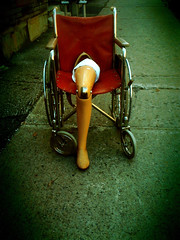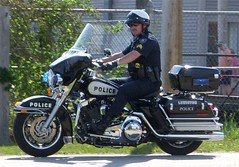 |
 by missmeng by missmeng |
One evening, Paul, Kathy, and Karen, the woman who shared the community liaison officer job with Kathy, and I went out for pizza. Kathy's husband was still in Liberia. Karen's husband was also out of the area. Paul was single. So none of us had someone at home waiting for us to return.
Since I was a rover, not a permanently assigned staff member, I was not issued a cell phone when I arrived in Madagascar. As spouses of permanently assigned staff, neither Kathy nor Karen had cell phones. And Paul's phone needed to be charged, so he left it at home in the charger. We all had emergency radios, but none of us were in the habit of carrying them around. They all sat in the chargers in our bedrooms, our safe rooms. So we weren't bothered during the meal. The pizza was good, the conversation was great, and we thought nothing of staying out until late.
All the houses the embassy leased had safe rooms, a room in the house with solid doors that would withstand battering, with serious locks on the inside. The safe room also had to have access to a bathroom, so the safe room in my house was the master bedroom suite. The bathroom had two doors, one that led to the bedroom and a second that led to the hall between the dining room and the living room so that it could also serve as a guest bathroom. Both the door to the bedroom and the door from the hall to the bathroom were safe room doors, but the door between the bedroom and the bathroom was not. These upgrades had recently been accomplished because the Department was determined that all steps to keep staff safe overseas, both in the office and at home, be taken. Improving the security of homes was often easier than improving the security of the embassy since the locations of many embassies had been selected decades before for their convenience for people coming to the embassy. The embassy in Antananarivo, or Tana for short, for example, was on a one-way street without any setback between traffic and the building. The only significant improvements that could be made to the embassy required that a new one be built somewhere at the edge of town. As a result, a lot of money was spent to install safe rooms in the residences.
However, the solid door leading to the bathroom from the hall was so warped that the deadbolt wouldn't lock. In fact, the lock on the knob barely latched, risking the privacy as well as the security of anyone inside. All the locks for the bathroom were inside the bathroom, so I really didn't have a saferoom at all. But I never felt the need for one in Madagascar. The real risks in Tana were traffic accidents and fires, not robberies or terrorists.
It was late when I got home from the pizza dinner. I was already in bed when the phone rang. The phone was in an alcove at the end of the dining room, outside the safe room. It wasn't really all that far from the bedroom, but by the time I got to the phone, there was no one at the other end. I went back to bed.
And then I tried to figure out just who would have called me so late at night. My first guess was that it was from the embassy, but instead of calling the operator to find out if the call had been placed through him, I concluded that if it was really important, they would call me back. Any other scenario I could think of presented the same alternative: if it was really important, the caller would try again.
So I went to sleep. The phone didn't ring again. And in the morning, Kathy brought me to work, as usual.
Within a few minutes of sitting down at my desk, Stephanie, the first-tour consular officer and general services officer (posts in Africa have the highest proportion of first-tour officers as the only one filling a specific type of position or even two positions of all regions), burst into my office and asked where I had been the night before. She said they had been trying to reach me all evening because Ben, the regional security officer, lost his leg in an accident on his way home from work. The word lost seemed strange so I asked her if she meant that Ben broke his leg. She replied, still with a bit of a frantic tone in her voice, that his leg had been cut off completely, not just broken.
Ben had been a motorcycle policeman before he joined the Foreign Service. He rode a motorcycle to and from work each day. Having a motorcycle shipped as a personally owned vehicle or POV was allowable, but the Department advised against it since relying on a motorcycle as the only means of transportation was unwise. But Ben's wife was also in the Foreign Service, so she was also authorized a vehicle. Her vehicle was their family car. And Ben was a very accomplished motorcycle rider.
Tana is situated on many hills which makes the routes from one place to another much longer than as the crow flies with some routes serving as the sole path between multiple sets of destinations. Traffic is always heavy on the most frequently used routes, especially at the beginning and end of the work day. In addition, I never saw a working traffic light in the city. Drivers squeezed their vehicles into whatever gaps in the traffic they could find, regardless of how much traffic going other directions may be interrupted. Ben was able to squeeze his motorcycle into many tight spaces, but to the driver who cut him off as he made a right turn in front of him, Ben was invisible. The driver cut him off, and his car then literally cut off Ben's leg.
Ben had the presence of mind at that point to do two things, one of which saved his life and the other nearly saved his leg. The first thing he did was stop a minibus and tell the driver to take him to the house of the U.S. deputy chief of mission. The second thing was to grab his leg as he got onto the bus.
Since I wasn't present during any of the events that followed, I don't know all the details, but I am convinced that someone's guardian angel was present for Ben that night. The coincidence of events that preceded the accident had a profound effect on what happened that night.
First, the regional medical officer (RMO) from South Africa had arrived for a visit two days before. On the day of Ben's accident, the RMO and Sandra, the foreign service nurse practitioner, had visited several clinics and hospitals in Tana and had agreed on which of them the embassy should rely on in an emergency.
Second, the RMO was still in town, staying in a hotel downtown.
Third, the duty officer that week, Gary, and Sandra were at home that evening. Their houses were in the same neighborhood as all the rest of the homes of embassy staff including thr DCM's residence. Only the ambassador's home was in another part of town.
Ben knew that if he was taken to a hospital, we would never find him. But if he could get to the DCM's house, he would be close to Sandra who could give him emergency care. In addition, Gary, the duty officer, had completed a CERT (Community Emergency Response Training) course and had an additional medical kit at his home, making him about the best first responder beyond Sandra that the embassy had. And Ben knew that even if the DCM wasn't at home, there would be staff at the house who could contact others.
When the minibus arrived at the DCM's house, Zack, the DCM, contacted Gary and Sandra and they drove in a caravan to the hospital. They contacted Stephanie to begin the arrangements to get approval for the crew of a medevac plane to arrive and for clearance to get Ben and the RMO onto the tarmac for a flight out. The junior economic officer went to the hotel to get the RMO and then to one of the largest restaurants to see about getting ice to pack around Ben's leg. The RMO met Sandra and the others at the hospital they had agreed on as the preferred hospital where Ben underwent surgery to stop the blood loss and save the remainder of his leg. It was already too late to consider reattaching Ben's leg.
While in the hospital, Ben remembered to tell Zack that his gun flew out of his holster during the accident. Sandra drove back to the site of the accident and searched in the dark until she found the weapon.
Somewhere in the middle of the night, the medevac plane arrived and took Ben and the RMO back to South Africa for further surgerey. From there, Ben was flown back to the U.S. to be fit for a prosthetic leg and rehabilitation.
Somewhere in the middle of the night, the medevac plane arrived and took Ben and the RMO back to South Africa for further surgerey. From there, Ben was flown back to the U.S. to be fit for a prosthetic leg and rehabilitation.
 |
 by sarah0s by sarah0s |
When things had settled down enough for us to think clearly, we considered options for filing a worker's compensation claim. My experience with both the death of the local guard in Sanaa and subsequent experience with the Department of Labor's attitude towards claims only being relevant if they occurred during the performance of duties led me to be pessimistic about the likelihood of the claim being accepted since Ben was on his way home from the office at the end of the work day when it happened. But Zack had more courage and pointed to that gun as evidence that the RSO was always on duty. He signed the claim form to state the accident occurred while Ben was performing his assigned responsibilities, the claim went in, and it was approved. Ben received compensation for the loss of one limb as well as coverage of all the costs for his prosthetic leg and rehabilitation associated with the accident.
My guardian angel had kept me out of the whirlwind that night. Maybe my guardian angel was on duty for Ben as well.


No comments:
Post a Comment